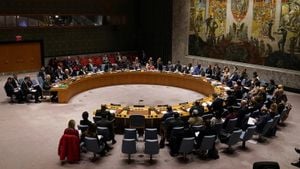Former Labour Member of Parliament Mike Amesbury has been sentenced to ten weeks behind bars after pleading guilty to assault. Amesbury, who represented Runcorn and Helsby, was sentenced by Chester Magistrates’ Court for punching 45-year-old Paul Fellows on Main Street, Frodsham, Cheshire, during the early hours of October 26. Following the incident, he was quickly suspended from the Labour Party, which maintains strict standards for its members.
Home Secretary Yvette Cooper, voicing her disapproval, stated, "I think the Runcorn constituents deservebetter, and we wanted to see a new MPin place as swiftly as possible." Her comments came as the fallout from Amesbury's actions led to urgent calls for representation changes for his constituents.
Amesbury's actions were met with widespread condemnation from both parliament members and local constituents. Victoria Atkins, the shadow environment secretary, called it "extraordinary" for someone like Amesbury to continue collecting his salary from prison. She emphasized, "I find it extraordinarythat someone can claim their salary from their prison cell when their job is to be here in parliament representing their constituents." This sentiment echoed around Westminster, prompting heated debates about the responsibilities and privileges of MPs.
Nevertheless, as it stands, MPs receiving custodial sentences automatically trigger recall petitions, allowing constituents to petition for by-elections if 10% sign the request. Yet, due to Amesbury's impending appeal against his sentence, the situation remains hung up, with immediate changes not yet possible.
Reform UK, which came second to Labour during the last general election, has also chimed in, urging Amesbury to step down immediately. "The great people of Runcorn deserve farbetter than waiting six weeks for arecall," stated Zia Yusuf, the party's chairman. His call reflects the deep frustrations among constituents who seek immediate representation.
Addressing the gathering concerns, Cooper noted, "It’s completely unacceptable what has happened." She reiterated the Labour Party's swift decision to suspend Amesbury following the incident, insisting on the need for adequate representation. "We need to have a newly elected Labour MP for them to get thebetter representation," she affirmed. The push for urgent change highlights the tension between maintaining parliamentary protocol and the demand for accountability from elected officials.
Politically, this situation reflects underlying issues within the framework governing MPs, particularly about how they are compensated during legal troubles. Current rules mean MPs continue to receive their pay until they are officially removed from their posts. This loophole has sparked discussions about reforms, as more constituents find themselves among the affected electorate.
While the ramifications of this incident extend onto parliamentary discourse, the primary focus remains on the constituents of Runcorn and Helsby. With historical preferences to have representatives aligned with their communities, the current narrative raises doubts about Amesbury’s ability to perform duties, even if he retains his seat pending the appeal process.
The unexpected events surrounding Amesbury have drawn attention not only to his personal reckoning but the broader issues surrounding the accountability of public officials. Calls for clearer regulations have intensified, with leaders like Cooper drawing attention to the inherent expectation of MPs as servants to the public, emphasizing their role as representatives obliged to uphold community standards.
Local constituents, who are undoubtedly experiencing the repercussions of this incident, await decisive action. Amidst discussions and rising calls for change, what remains clear is the urgent need for fresh leadership and representation within Runcorn. This serves as both warning and opportunity, urging the parliament and its members to reflect not only on morality but also on the significant trust they share with the communities they serve.
Amesbury’s situation challenges existing notions of what it means to represent the public's best interests, serving as both an example of the fallout from individual actions and how such actions ripple through the entire political framework.



